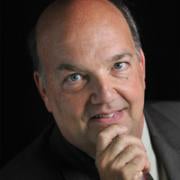Five Questions for Richard Wobbekind
Thank a man and some gorillas in a cage for pushing Richard Wobbekind to study economics, but thank his parents and mentors for helping him become a voice that thousands of business people listen to every year.
As director of the Business Research Division in the Leeds School of Business at the University of Colorado at Boulder, Wobbekind and his staff, along with about 80 experts, assemble economic data into a yearly report, theColorado Business Economic Outlook. The forecast for this year, in general, points to a slow recovery, but relatively high unemployment through the third quarter. The annual report was begun by William Baughn, then dean of the CU College of Business, some 45 years ago. Wobbekind has been preparing the report since 1988. So what does our economic future hold, and what about those gorillas?
— Cynthia Pasquale
1. The economic outlook report found that consumers have altered their consumption patterns. Businesses, too, have changed their thinking, asking workers to do more with less. How will this pattern affect the future?
The Great Depression had a profound impact on those who lived through it. It permanently impacted the way people thought. I think this downturn was severe enough that in the future, the financial system will curb the amount of lending it does. Households are getting the sense they have to take a little more control of spending. We went from a 0 percent savings rate (before the downturn) to 8 percent (during the deepest part of the recession). Now we're at 4.6 percent, and I think somewhere in the 3 percent to 4 percent range will be where we end up.
In this downturn, there have been tremendous productivity increases. Businesses want to produce similar outputs but with fewer people. But in certain industries, to continue to provide what is needed, they will have to hire more people. By next year, wage structures will begin to push upward as we see more of a labor force recovery.
2. How did you choose your career path?
I used to like to talk to people about their problems, and I was a leader of sorts in school, and thought if I was going to keep talking, I should become a psychologist. For my undergraduate degree, I entered a psych program. But the psych people were the weirdest people I have ever met in my life. This was back in the '70s. One of my faculty members was living in a cage with gorillas. He would show up to class without showering, so it was like being in the cage, too. I was pretty accepting, but that was a little too strange for me.
I took a "principles of econ" class, and thought it was good, but I didn't do very well. I thought I would try one more class. The faculty was excellent. They intrigued and coaxed me.
I've also had great mentors who helped show the way. I received my Ph.D. in economics from CU. I always try to appreciate mentors like Professor Reuben Zubrow and past Chancellor Russ Nelson. When the sun sets, the people who did the most were my parents, who placed an incredibly high value on education. They were immigrants with little money but did whatever they could do to make sure their children were educated.
3. You have many duties at the university, including teaching. Which do you enjoy most?
I teach in the MBA program and am the associate dean for MBA and enterprise programs in the Leeds School of Business. I enjoy teaching the most. I enjoy helping people understand something that they think is very complex. I enjoy that in public presentations, too, but when you work with a class over the long-term, you can watch the students' thought process evolve over time. They begin to process information in a more meaningful way, and that will help them all through their lives. That's harder to achieve in a short speech.
4. What's the hardest thing about living/working in Boulder? Do you have time for hobbies?
In terms of education, living in a place like this helps the university attract a high-quality student, but you have to keep them totally focused. They've come to a community that has a great work/life balance, but we'd like them to be more aggressive. Businesses expect them to be passionate and hard-working, but those qualities are sometimes hard to coax out of them in this environment.
Personally, I am a product of Chief Niwot's curse. (Legend says that in 1858, a band of Southern Arapahos encountered a party of gold seekers near Boulder and told them to leave. The chief, Niwot, supposedly said: "People seeing the beauty of this valley will want to stay, and their staying will be the undoing of the beauty.") I refuse to leave, and I'm very happy that we stayed. And my children all are very happy that they were raised here. But I'm certain my career would have been better had I left.
My relaxation is working in my yard. I have some organic vegetable gardens and ponds, and my son says, "Your golf is your yard." I enjoy going out for a nice meal and a glass of good red wine.
5. What would you consider the best investment to make in this economy?
Education is the best investment. I strongly believe that you need to be well-educated and adaptable. The country is starting to become bimodal, stratifying society in terms of education and that translates to income. We have a competitive, knowledge-based economy and that isn't good with an undereducated workforce.


